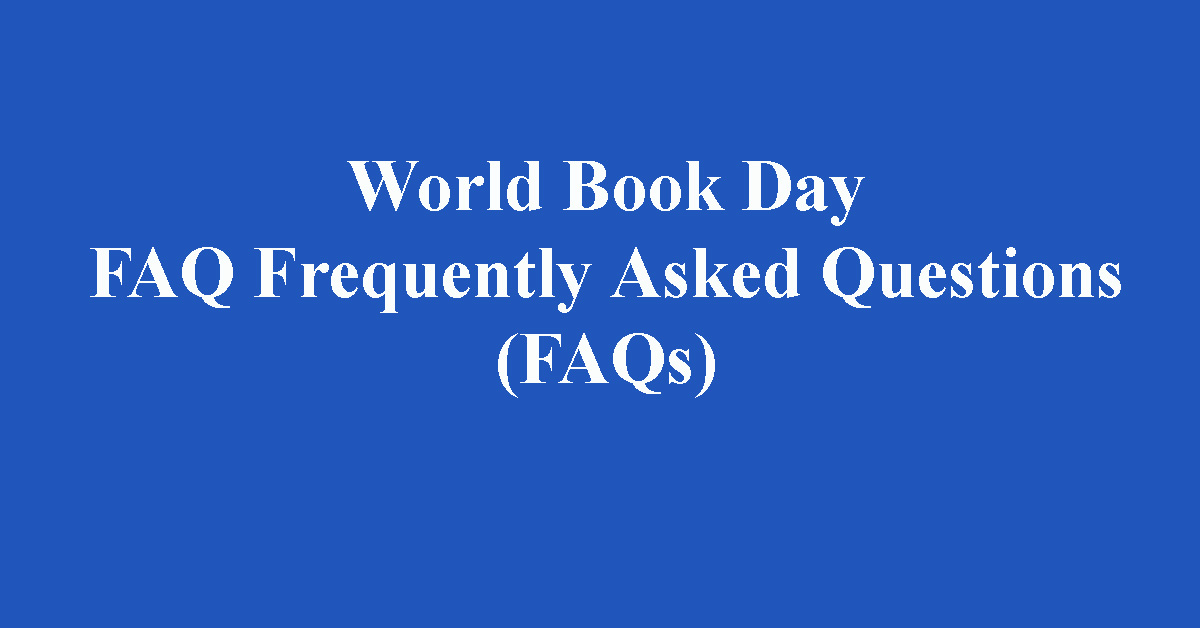World Book Day FAQ Frequently Asked Questions (FAQs)
World Book Day FAQ Frequently Asked Questions (FAQs), Celebrate Literacy: World Book Day Insights, Discover the essence of World Book…
World Book Day FAQ Frequently Asked Questions (FAQs), Celebrate Literacy: World Book Day Insights, Discover the essence of World Book Day with insights into its global celebration, promoting literacy, cultural diversity, and the joy of reading among all ages.
1. What is World Book Day?
- World Book Day is a worldwide celebration of books and reading, observed annually on April 23rd in most countries and on the first Thursday in March in the UK and Ireland.
2. When was World Book Day first celebrated?
- World Book Day was first celebrated on April 23, 1995, organized by the United Nations Educational, Scientific and Cultural Organization (UNESCO) to promote reading, publishing, and copyright.
3. Why is World Book Day celebrated on April 23rd?
- April 23rd is a symbolic date for world literature as it marks the death anniversary of renowned authors including William Shakespeare, Miguel de Cervantes, and Inca Garcilaso de la Vega.
4. How is World Book Day celebrated?
- World Book Day is celebrated through various activities such as book fairs, reading events, author signings, storytelling sessions, and dressing up as favorite book characters, especially among children.
5. What is the purpose of World Book Day?
- The primary purpose of World Book Day is to promote reading, literacy, and the enjoyment of books across the globe, with a focus on fostering a love for literature among people of all ages.
6. Is World Book Day celebrated globally?
- Yes, World Book Day is celebrated globally in over 100 countries, albeit on different dates in some regions. It’s recognized as an important event by UNESCO and various literary organizations worldwide.
7. How can I participate in World Book Day?
- You can participate in World Book Day by reading books, sharing your favorite reads with others, attending book-related events, supporting local bookstores, and engaging in activities organized by schools, libraries, and communities.
8. What is the theme for World Book Day?
- Each year, World Book Day may have a specific theme chosen by UNESCO or individual countries to highlight particular aspects of literature, reading, or cultural diversity.
9. Are there any special offers or promotions on World Book Day?
- Yes, many bookstores and publishers offer special discounts, promotions, or giveaways on World Book Day to encourage book purchases and reading habits.
10. How can schools and libraries participate in World Book Day?
- Schools and libraries can participate in World Book Day by organizing reading events, book swaps, author visits, storytelling sessions, and creative workshops to engage students and patrons in celebrating literature.
Related: World Book Day: Celebrating Literature, Fostering Imagination Join TELEGRAM
World Book Day FAQ Frequently Asked Questions (FAQs)
11. Can individuals organize their own World Book Day events?
- Yes, individuals, book clubs, community groups, and organizations are encouraged to organize their own World Book Day events, such as book drives, literary discussions, poetry readings, or book-themed parties.
12. What role do authors play in World Book Day?
- Authors play a significant role in World Book Day by participating in events, book signings, readings, and engaging with readers to promote their works and the joy of reading.
13. Is World Book Day only for promoting printed books, or does it include digital formats as well?
- World Book Day celebrates all forms of reading, including printed books, e-books, audiobooks, and digital literature, recognizing the evolving landscape of publishing and reading preferences.
14. Are there any educational initiatives associated with World Book Day?
- Yes, many educational initiatives are associated with World Book Day, including literacy campaigns, reading challenges, book donations to underprivileged communities, and programs to promote access to books in schools and libraries.
15. How does World Book Day promote cultural diversity in literature?
- World Book Day promotes cultural diversity in literature by showcasing books from diverse authors, languages, and cultures, fostering understanding, empathy, and appreciation for different perspectives and experiences.
16. Is World Book Day only for children, or is it for people of all ages?
- World Book Day is for people of all ages. While it often includes activities tailored for children and young adults, there are also events and initiatives aimed at adults, promoting lifelong reading habits and literary enjoyment.
17. How can businesses support World Book Day?
- Businesses can support World Book Day by organizing corporate reading challenges, sponsoring book donations, hosting book-themed events for employees, or partnering with literacy organizations to promote reading initiatives.
18. Are there any virtual or online activities for World Book Day?
- Yes, especially in recent years, there has been an increase in virtual or online activities for World Book Day, including virtual author talks, online book clubs, social media campaigns, and digital storytelling sessions accessible to a global audience.
19. What impact does World Book Day have on literacy rates and reading habits?
- World Book Day plays a crucial role in promoting literacy rates and encouraging reading habits worldwide by raising awareness about the importance of reading, providing access to books, and fostering a culture of reading in communities.
20. How can individuals continue to celebrate and promote the spirit of World Book Day beyond April 23rd?
- Individuals can continue to celebrate and promote the spirit of World Book Day throughout the year by reading regularly, supporting local bookstores and libraries, participating in book clubs, sharing their love of books with others, and advocating for literacy initiatives in their communities.
